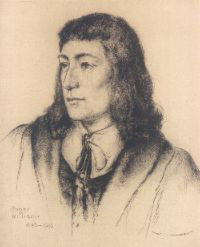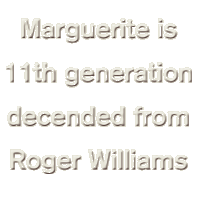Roger Williams was born in London in 1603; he was educated at Cambridge and studied to be a minister of the Church of England. He later converted to a Protestant Puritan religion hoping to cleanse the church of lingering elements of Catholic practice. The Puritans immigrated to form a pure, nonpolitical, uncorrupted and non-compromised church in America. Roger married Mary Barnard in 1629 and in 1630 sailed on the ship Lyon to Nantasket, MA, just south of Boston. He went to Salem where he was to be a minister but because of conflict was not elected.
He continued preaching and serving in Salem espousing several beliefs saying that religion was depriving Indians of their property, and that swearing an oath to God was worthless if the swearer did not believe in God. In 1635 he was warned that his opinions were dangerous and erroneous and in October of 1635, he was exiled from Massachusetts. He left in January 1636 and for 14 weeks wandered in the snowy wilderness. He was taken in by the Indians and came to the headwaters of the Narragansett and purchased land from the Indians. He named the area Providence and in 1637 sent for his family. Other families joined him and in 1640 there were 40 families there. They believed the land was not the King’s to give but belonged to the Indians.
In 1638, he helped establish the Baptist Church in Providence but later left it because he believed it was not directly in the apostolic line from Christ. However, he supported the church and was an active campaigner for religious liberty. Anne Hutchison and several of her followers came to Rhode Island upon being exiled from Massachusetts.
In 1643, he sailed to England to secure legal standing for Rhode Island and there published a book entitled “Key to Language of America” describing the life of Indians. He received a Charter from Parliament but this Charter was challenged by Coddington who wanted a separate section for the Newport area. This required another trip to England and in 1663 a new Charter was given not dividing the colony and giving full liberty in religious concerns.
Roger believed in a New Testament church and declined to support an official religion since there was no direct apostolic succession from Jesus after the Pope appropriated power. He believed we must wait for the millenium until Christ returns for a New Testament church. He wrote a tract to Parliament entitled “Queries of Highest Consideration” in 1644 stating the following points among others: Religious persecution was an utter violation of the Christian spirit and of fundamental humanity; religious warfare has been the curse of civilization; when persons are forced to conform to a mode of worship that their “hearts embrace not” they are violated to the very depths of their being and any one who says that he seeks more spiritual light but is still willing to persecute scorns every standard of Christianity and humanity.
Williams is perhaps best known as a strong advocate of religious tolerance. Tolerance is not the word he would have used as it implies a concession by a power that had the right to persecute but on occasion graciously chose not to. Williams believed that liberty in religion was a God given right that no king or state could deny belonging to all human beings by virtue of their humanity – as much as their right to breathe or life itself, they had the right in religion to be totally free.
Back to top
